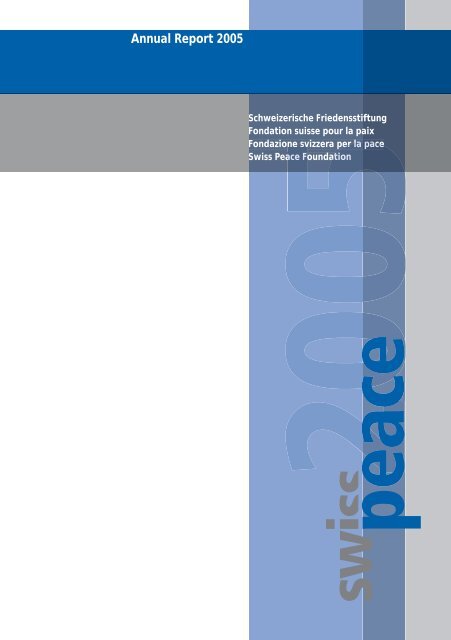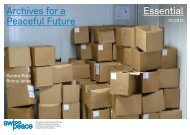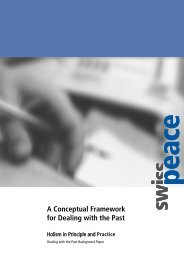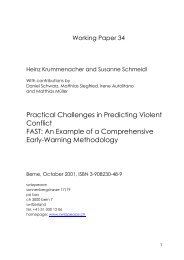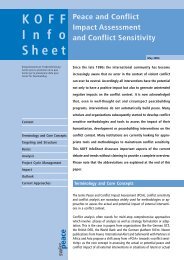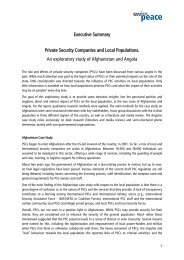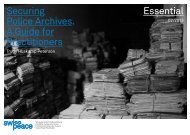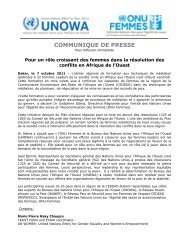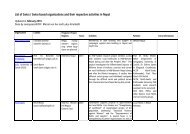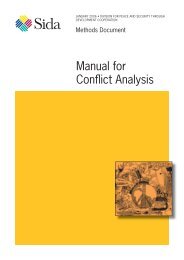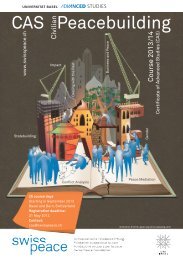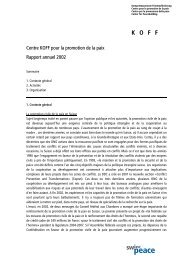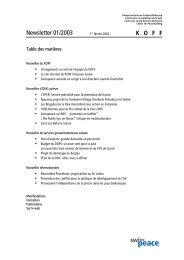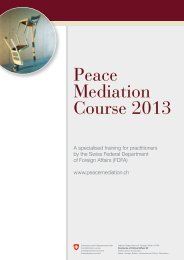English - Swisspeace
English - Swisspeace
English - Swisspeace
You also want an ePaper? Increase the reach of your titles
YUMPU automatically turns print PDFs into web optimized ePapers that Google loves.
Annual Report 2005<br />
Schweizerische Friedensstiftung<br />
Fondation suisse pour la paix<br />
Fondazione svizzera per la pace<br />
Swiss Peace ace Foundation
Impressum<br />
swisspeace Annual Report 2005<br />
Circulation: 1500 German, 300 French, 600 <strong>English</strong><br />
Publisher: swisspeace<br />
Sonnenbergstrasse 17, CH-3000 Bern 7<br />
Tel +41 (0)31 330 12 12<br />
Fax +41 (0)31 330 12 13<br />
info@swisspeace.ch<br />
www.swisspeace.org<br />
Editor: Ellen Bernhard, swisspeace<br />
Design: Jenny Leibundgut, Bern<br />
Print: Burkhardt AG, Bern
Table of contents<br />
«A more peaceful world is possible – swisspeace can make a difference» 4<br />
Peter Hug: Retirement from offi ce after 20 years of commitment to swisspeace 5<br />
Annual Report of Executive Management – developments 2005 6<br />
FAST International sets standards in political early warning 8<br />
Positive assessment of the Center for Peacebuilding 10<br />
Withdrawal from operational activities in Afghanistan 12<br />
«Governance and Confl ict» – the NCCR North-South Work Package 1 14<br />
Human security in theory and practice 15<br />
Economic actors and peace processes 16<br />
International mediation as a new fi eld of activity 17<br />
Publications 2005 18<br />
Our web recommendation: www.swisspeace.org 20<br />
Community service with swisspeace 21<br />
Financial statement 2005 22<br />
Staff 2005 24<br />
Foundation Board and Scientifi c Advisory Board 25<br />
Support Association 2005 26
«A more peaceful world is possible – swisspeace<br />
can make a difference»<br />
This is the core message of a paper<br />
adopted by the Foundation Board and<br />
was defi ned as the main goal of the<br />
«Midterm Strategy for 2006 – 2010»,<br />
which was the result of intensive preparatory<br />
work by the Executive Management<br />
and the Committee. The work of<br />
swisspeace is to be built on this vision.<br />
The goal as defi ned in the organization’s<br />
guidelines is as follows: As an institution,<br />
swisspeace provides core competencies<br />
in early warning and confl ict analysis<br />
as well as peacebuilding. swisspeace<br />
generates scientifi c research contributions<br />
in these fi elds of activity, implements<br />
practice-oriented programs and<br />
projects, and engages in public relations.<br />
swisspeace introduces its experiences and<br />
insights into academic discussions as well<br />
as political decision-making and opinion-forming<br />
processes. swisspeace strives<br />
to be the Swiss center for applied peace<br />
research. This goal obliges the Foundation<br />
Board, the Executive Management, and<br />
the swisspeace team to carry out highly<br />
qualifi ed scientifi c work and simultaneously<br />
remain close to practitioners` work.<br />
This combination of theory and practice<br />
clearly carves out a profi le for swisspeace<br />
that will be maintained and strengthened<br />
further. The adoption of the midterm<br />
strategy is another signifi cant step in this<br />
direction.<br />
Every day, many people work and strive<br />
to bring us closer to achieving the goal<br />
of a more peaceful world. I owe the<br />
swisspeace employees my thanks for their<br />
committed peacebuilding and research<br />
work. I would also like to express my<br />
gratitude to the members of the Foundation<br />
Board who steer the fate of<br />
swisspeace through their honorary mandates,<br />
as well as to the benefactors of<br />
swisspeace who support our work fi nancially<br />
and in many other manners. I would<br />
like to thank Dr. Peter Hug in particular,<br />
a long time member of the Foundation<br />
Board. He has worked especially hard<br />
to further independent peace research in<br />
Switzerland and has contributed substantially<br />
to the establishment and expansion<br />
of swisspeace as a peace research<br />
institution. Peter Hug resigned from his<br />
swisspeace functions in autumn 2005.<br />
The Foundation Board has appointed him<br />
an honorary member. I would like to wish<br />
him and his family all the very best for the<br />
future. The board of directors has elected<br />
Dr. Sandra Hedinger to replace Peter Hug<br />
as councilor responsible for fi nancial<br />
matters. I would also like to express my<br />
sincere condolences to the family of<br />
Madame Monique Bauer-Lagier for their<br />
loss. As a member of the Swiss Council<br />
of States, Mrs. Bauer-Lagier played an<br />
important role in the establishment of<br />
swisspeace and the furthering of an independent<br />
peace research institution in<br />
Switzerland.<br />
Fritz R. Staehelin, President<br />
4
5<br />
Peter Hug: Retirement from offi ce after 20 years<br />
of commitment to swisspeace<br />
«After almost 20 years of affi liation with<br />
swisspeace, at the end of 2005, I resigned<br />
from the Foundation Board and its committee<br />
for family reasons. I fi rst came into<br />
contact with swisspeace at the beginning<br />
of 1987 when church representatives<br />
Hans-Balz Peter and Pius Hafner<br />
appointed me to a 10% secretarial function<br />
within the group preparing the establishment<br />
of a Swiss Peace Foundation. The<br />
churches launched this initiative after a<br />
recommendation made by the Swiss Scientifi<br />
c Council in 1972 and a parliamentarian<br />
initiative launched by SP National<br />
Councilor Heinrich Ott in 1980 involving<br />
the foundation of a state peacebuilding<br />
institution failed to be realized. The<br />
churches organized discussions between<br />
church, military, foreign policy and scientifi<br />
c circles on the expansion of peace and<br />
security policy research in Switzerland<br />
within civil society. These talks took place<br />
at the Castle of Lenzburg in 1984. Chief of<br />
Staff of the Armed Forces Jörg Zumstein<br />
and Theodor H. Winkler from the Swiss<br />
Federal Military Department (EMD) also<br />
attended this meeting, which led to mistrust<br />
on the side of the peace movement.<br />
Consequently, the board of the forum for<br />
practice-oriented peace research stated<br />
that «this project takes too much consideration<br />
of the interests of the Swiss<br />
Federal Military Department (EMD) and<br />
the Swiss Federal Department of Foreign<br />
Affairs (DFA). Too much emphasis is<br />
placed on the necessity of military elements.<br />
There is too much concordance<br />
and compromise involved». Similar criticism,<br />
yet stressing the opposite, was reg-<br />
istered by the other side. A member of the<br />
project committee stated that «the pronounced<br />
politically left-oriented, pacifi staggressive<br />
and military-hostile components<br />
are too strongly represented».<br />
I considered this ideological dispute to<br />
be absolutely unfruitful. It motivated<br />
me to become involved in the establishment<br />
of an institution that would be able<br />
to bridge the gap between the opposing<br />
parties and to contribute professionally<br />
and in concrete terms to peacebuilding.<br />
On May 26, 1988, we were able to<br />
found the Swiss Peace Foundation. The<br />
circumstances proved to be unexpectedly<br />
favorable. In 1988, military expenditures<br />
were cut markedly for the fi rst time.<br />
Furthermore, long-standing regional confl<br />
icts in countries as varied as Afghanistan,<br />
Cambodia, Angola, Namibia and<br />
Nicaragua could be settled peacefully or<br />
at least negotiated on a political level.<br />
swisspeace had chosen precisely the right<br />
moment to offer the world its highly valuable<br />
services.<br />
Today, peacebuilding has even become<br />
benefi cial for an academic career.<br />
swisspeace has been able to establish<br />
excellent ties with administration<br />
and research. Nevertheless, much work<br />
remains to be done in order to ingrain<br />
issues related to peace and politics more<br />
fi rmly in politics and the general public.»<br />
Peter Hug
Annual Report of the Executive<br />
Management – developments 2005<br />
swisspeace can look back on a very successful<br />
year. Thanks to the success of the<br />
midterm strategy and the formation of<br />
a scientifi c advisory board, the course<br />
for the future success of the organization<br />
could be set. All program and project<br />
activities launched were able to project<br />
the image of a highly competent and<br />
competitive peace research institution<br />
not only in Switzerland but also abroad.<br />
Moreover, through the plans to form a<br />
Swiss research network for international<br />
relationships (an extension of the «pôle<br />
genevois» to a «pôle helvétique»), the<br />
signifi cance of swisspeace should continue<br />
to grow in the future.<br />
KOFF as national…<br />
The Center for Peacebuilding (KOFF) has<br />
been able to establish itself as a political<br />
peace platform in Switzerland. By<br />
organizing events of great current interest<br />
but nevertheless of thematic continuity<br />
(e.g. Tsunami and confl ict sensitivity),<br />
KOFF has mastered the diffi cult balancing<br />
act between carrying out planned activities<br />
and spontaneously and brilliantly taking<br />
up new topics. KOFF’s success was<br />
confi rmed further when the Swiss Federal<br />
Department of Foreign Affairs (DFA)<br />
rewarded KOFF’s work with a three-year<br />
contract (see p. 10–11).<br />
… and FAST / ACSF as international role<br />
models<br />
FAST International, the political early<br />
warning system, persistently pursues its<br />
ambitious goals through geographical<br />
expansion, methodological development<br />
and the consistently high quality<br />
of its products and services. Additional<br />
successes proved to be possible in all<br />
three fi elds – even though the desired<br />
long-term funding could not yet be<br />
secured (see p. 8–9). swisspeace’s only<br />
operational project to date, the internationally<br />
acclaimed Afghan Civil Society<br />
Forum (ACSF), is a special kind of success<br />
story. After working actively on site for<br />
four years, the organization was placed<br />
in Afghan hands at the end of 2005<br />
(see p. 1–13).<br />
Annual Conference on Chechnya<br />
Beyond the usual media attention,<br />
throughout 2005 efforts continued on the<br />
«Humanitarian Dialogue on Chechnya»,<br />
fi nanced by Sweden and Switzerland. It<br />
was therefore no coincidence that the<br />
swisspeace Annual Conference 2005 was<br />
dedicated to Chechnya. This refl ects our<br />
wish to share our work with interested<br />
parties in Switzerland. Moreover, we considered<br />
it to be important to remind the<br />
public of this often forgotten violent confl<br />
ict and to demonstrate that Switzerland,<br />
as a neutral state, can actively contribute<br />
to peacemaking efforts in such confl<br />
ict regions.<br />
6
swisspeace NCCR<br />
7<br />
North-South<br />
The second phase (2005–2009) of the<br />
research program of the National Centre<br />
of Competence in Research North-<br />
South (NCCR) was launched in July 2005.<br />
As the only non-university project partner,<br />
swisspeace was entrusted with the<br />
management of the work package «Governance<br />
and Confl ict», as well as two<br />
so-called transversal projects – «Operationalizing<br />
Human Security» and «The<br />
Political Economy of Coffee». On the one<br />
hand, we interpret this as the recognition<br />
of our past work, and on the other hand,<br />
this motivates us to pursue our research<br />
activities in these fi elds (see p. 14).<br />
Midterm strategy, staff development, and<br />
scientifi c advisory board<br />
The Executive Management was particularly<br />
pleased to be able to fi nalize<br />
swisspeace’s midterm strategies for<br />
the period from 2006 to 2010, with the<br />
involvement of all employees, the Foundation<br />
Board and – in particular – the Committee<br />
of the Foundation Board. This document<br />
shall serve as our basic plan for a<br />
successful future. The revision of staff regulations<br />
and the change to annual working<br />
time should appeal to highly qualifi ed<br />
and motivated employees and hopefully<br />
keep them committed to swisspeace for<br />
the long-term. Finally, thanks to the creation<br />
of a scientifi c advisory board, our<br />
research plan could be professionalized.<br />
The well-known people we have been<br />
able secure as board members (see p.<br />
25) undoubtedly insures that the direction<br />
and quality of research undertaken<br />
by swisspeace will continue to meet the<br />
highest scientifi c criteria.<br />
Annual fi nancial statement and fi nancial<br />
situation<br />
swisspeace’s profi t and loss statement<br />
2005 shows losses amounting to CHF<br />
10 851. This can be traced back primarily<br />
to the circumstance that federal contributions<br />
were cut because of parliament’s<br />
need to save money. Moreover, the<br />
Swiss National Fund demands that benefi<br />
ciaries continuously increase the share<br />
of self-funding – with serious consequences<br />
for us particularly during the second<br />
half of the year. This will be felt to an<br />
even larger degree in 2006. swisspeace<br />
will only be able to cope with this situation<br />
fi nancially, if basic federal contributions<br />
are increased or if alternative fi nancial<br />
sources can be found. Within this<br />
context, the decision made in spring 2006<br />
to form a «pôle genevois» for international<br />
relations (which is to be expanded<br />
into a «pôle helvétique»), is a promising<br />
perspective. swisspeace has been intensively<br />
involved in this process and is convinced<br />
that, within the establishment of a<br />
future national network, it will be able to<br />
play an important role as a practice-oriented<br />
peace research organization.<br />
Laurent Goetschel<br />
Director<br />
Heinz Krummenacher<br />
Managing Director
FAST International sets standards in political<br />
early warning<br />
The management of violent confl icts<br />
requires functioning early warning systems.<br />
At least rhetorically, this insight is<br />
common knowledge. However, there are<br />
still far too few such warning systems in<br />
place. FAST International is one of them<br />
and sets international standards. In July<br />
2005 FAST was thus asked to co-organize<br />
a workshop on early warning at the<br />
Global Partnership for the Prevention of<br />
Armed Confl ict (GPPAC) Conference in<br />
New York. One of the main insights resulting<br />
from this workshop was that the U.N.<br />
is not capable of assuming a leading role<br />
in early warning and that this role should<br />
rather be assumed by civil society and by<br />
states committed to confl ict prevention.<br />
The development agencies of Canada,<br />
Sweden, Austria, the U.S., and Switzerland<br />
seem to share this opinion. Since<br />
2005 they have fi nancially supported<br />
FAST International – and thanks to a<br />
marked increase in the Austrian contribution,<br />
we were able to increase the number<br />
of countries covered by FAST: In 2006 the<br />
Balkans will once again be on the FAST<br />
radar screen and FAST risk assessments<br />
will also be carried out shortly on Armenia<br />
and Azerbaijan. Despite all this positive<br />
news, it must be mentioned that FAST<br />
International has yet to reach the critical<br />
momentum required to ensure its longterm<br />
existence. This will only be possible<br />
if the list of FAST target countries can<br />
be signifi cantly expanded. Or to put it in<br />
the words of a U.S. donor representative:<br />
FAST International should be transformed<br />
into a «one-stop shop» for early warning.<br />
Canada proposed holding a donor conference<br />
in 2006, focusing on possibilities for<br />
ensuring the fi nancial sustainability of the<br />
program.<br />
Reinforcement of regional cooperation<br />
The outsourcing of some FAST activities<br />
to our partners in Russia (FEWER Eurasia)<br />
and South Africa (Institute for Security<br />
Studies) continued during the year under<br />
review. We have been co-operating with<br />
FEWER for some years now, and our cooperation<br />
has become even closer with the<br />
introduction of the «Humanitarian Dialogue<br />
with Chechnya» project fi nanced<br />
by Sweden and Switzerland. A network<br />
analysis based on FAST data, compiled by<br />
our local information networks, helped to<br />
8
F A S T<br />
9<br />
throw light on the interaction between<br />
the various confl ict parties in Chechnya<br />
and proved to be a further research milestone<br />
(the results of this study will be<br />
published in 2006 in the Journal of Confl<br />
ict Resolution). Furthermore, the tried<br />
and tested FAST products, the half-year<br />
FAST Updates as well as a series of new<br />
country risk profi les, continue to be published.<br />
A survey carried out among FAST<br />
Update users generated some very positive<br />
and encouraging feedback. Cutting<br />
back the number of Updates to two per<br />
year and country (which had to be done<br />
for fi nancial reasons) was deeply regretted<br />
by the respondents. Nevertheless, this<br />
measure has made it possible to offer<br />
FAST donor organizations other services<br />
tailored to meet their requirements. Thus,<br />
project documents were reviewed; ad-hoc<br />
situation analyses for certain countries<br />
and regions were generated; and employees<br />
of various development agencies were<br />
trained to work independently with the<br />
FAST database.<br />
State-of-the-art event data analysis<br />
As planned in the spring of 2005, the revision<br />
of the FAST database was completed.<br />
As a result, FAST International has not<br />
only gained an independent status with<br />
regard to the generation of data, but has<br />
also signifi cantly expanded its capacity to<br />
compile the data qualitatively and quantitatively.<br />
For instance, it is now possible<br />
not only to process data on the national<br />
level but also to generate highly detailed<br />
analyses on district or province levels. This<br />
is an important advantage in comparison<br />
to traditional event data analysis systems<br />
that are based on information provided by<br />
news agencies. Progress was also made<br />
in regard to the development of a model<br />
to forecast short-term developments of<br />
confl ict and cooperation – a one-of-akind<br />
model worldwide. Arrows indicate<br />
whether the situation in a certain country<br />
will remain the same, improve or deteriorate<br />
over the following months. These<br />
innovations can be accessed through the<br />
«FAST Reporter» website:<br />
www.swisspeace.org/fast/products2.<br />
Heinz Krummenacher<br />
FAST International Program Director
Positive assessment of the Center for<br />
Peacebuilding<br />
In 2005, the Center for Peacebuilding<br />
(KOFF) was externally evaluated for<br />
the fi rst time since its foundation. KOFF<br />
received an excellent assessment. At the<br />
same time, a midterm strategy for 2006 to<br />
2008 was developed, focusing on the topics<br />
«Reconciliation and Dealing with the<br />
Past», «Confl ict Sensitivity», and «Gender<br />
and Peacebuilding». Round tables<br />
were held on seven selected countries<br />
and regions. During the year under review,<br />
the KOFF was fi nancially supported by<br />
the Swiss Federal Department of Foreign<br />
Affairs (DFA) as well as 42 NGOs.<br />
Evaluation<br />
The external evaluation carried out in the<br />
spring of 2005 certifi ed that KOFF had<br />
«to a great extent« been able to adhere<br />
to its «Guiding Principles». The quality of<br />
its products was greatly appreciated; the<br />
output was high; the use of resources effi -<br />
cient; and project implementation was<br />
professional. Moreover, the report stated<br />
that KOFF exercises a stimulating infl uence<br />
on the process of developing competencies<br />
in civil peacebuilding within its<br />
support organizations. In comparison to<br />
similar organizations abroad, KOFF’s innovative<br />
character as a joint project of governmental<br />
and non-governmental organizations<br />
was highlighted. In terms of future<br />
strategies, the evaluators recommended<br />
that KOFF assume a stronger pro-active<br />
role in initiating multi-stakeholder processes<br />
among Swiss players.<br />
Advisory services<br />
KOFF’s support organizations frequently<br />
made use of KOFF advisory services in<br />
2005. Shorter individual consultations<br />
included professional advice on certain<br />
topics and countries, support in developing<br />
and moderating particular events,<br />
and the transfer of expertise. KOFF also<br />
offered longer-term support for programs<br />
and projects. The backstopping mandate<br />
on gender mainstreaming in Swiss peacebuilding<br />
capacities for the Political Affairs<br />
Division IV of the Swiss Federal Department<br />
of Foreign Affairs was extended<br />
in 2005. KOFF helped to integrate confl<br />
ict and gender sensitivity in the planning<br />
phase of a new Helvetas program for<br />
Afghanistan. KOFF advised the Political<br />
Affairs Division IV on the further development<br />
of its reconciliation program as well<br />
as on program on dealing with the past in<br />
the Balkans.<br />
Networking<br />
During the past years, KOFF established<br />
a series of platforms for the development<br />
of common learning processes and synergies<br />
between governmental and nongovernmental<br />
support organizations. In<br />
2005, once again, the most important<br />
forums were the geographical and topical<br />
round tables and working groups, complemented<br />
by selected individual events.<br />
For instance, together with the Political<br />
Affairs Division IV and the International<br />
Center for Transitional Justice (ICTJ) KOFF<br />
organized a two-day international conference<br />
on «Dealing with the Past and<br />
Transitional Justice: Creating Conditions<br />
10
K O F F<br />
11<br />
for Peace, Human Rights, and the Rule of<br />
Law». Over 100 professionals from international<br />
organizations, European foreign<br />
ministries and NGOs attended this conference.<br />
In 2005 KOFF organized more than<br />
30 such events.<br />
Training<br />
In response to continued demand from<br />
support organizations for further training,<br />
KOFF organized a series of training workshops<br />
in 2005. They included an introduction<br />
into participative confl ict analysis;<br />
two-day workshops on reconciliation<br />
in post-war societies; a state-of-the-art<br />
method for confl ict-sensitive project planning,<br />
«Do no Harm»; as well as training<br />
on «Gender and Trauma». Some support<br />
organizations also asked KOFF to carry<br />
out training exercises within their organizations.<br />
Moreover, together with Caritas<br />
Switzerland and Helvetas, KOFF organized<br />
workshops on «Do no Harm» and<br />
«Confl ict Sensitivity» for their local partners<br />
in the Horn of Africa and Bhutan,<br />
respectively. In addition to the training for<br />
members of the Swiss Ecumenical Peace<br />
Program (SOEF), KOFF also organized a<br />
workshop on reconciliation.<br />
Information<br />
The KOFF Newsletter is published ten<br />
times a year – it is Switzerland’s most<br />
important information source on civil<br />
peacebuilding. In 2005 the number of<br />
subscriptions increased once again by<br />
25% to 1,500. The KOFF Newsletter is<br />
published in three languages (German,<br />
French, and <strong>English</strong>). Approximately one<br />
third of the subscriptions are from abroad.<br />
Furthermore, KOFF staff gave numerous<br />
presentations at events in Switzerland<br />
and abroad, as well as lectures at various<br />
universities.<br />
Outlook<br />
A number of workshops as well as the<br />
swisspeace Annual Conference on «Dealing<br />
with the Past in Post-Confl ict Societies<br />
– Ten Years after the Peace Accords in<br />
Guatemala and Bosnia-Herzegovina» are<br />
among the highlights for 2006. In addition,<br />
various backstopping mandates for<br />
support organizations and a number of<br />
KOFF training workshops are planned. For<br />
the fi rst time since its foundation, funding<br />
has been secured through a three-year<br />
contract with the Political Affairs Division<br />
IV (2006-2008). This marks signifi cant<br />
progress in comparison to the current<br />
model, which required annual funding<br />
renewals.<br />
Anita Müller<br />
KOFF Program Director
Withdrawal from operational activities in<br />
Afghanistan<br />
After four years, swisspeace concluded<br />
its operational activities in Afghanistan in<br />
2005 and handed over the «Afghan Civil<br />
Society Forum» (ACSF) to the Afghanis.<br />
This temporarily marks the end of a successful<br />
Afghan – Swiss cooperation in<br />
peacebuilding activities in Afghanistan.<br />
In the spring of 2002, swisspeace established<br />
the «Afghan Civil Society Forum»<br />
(ACSF) with the goal of ensuring the participation<br />
of Afghan civil society in the<br />
ongoing peace and reconstruction process,<br />
as defi ned in the Treaty of Bonn of<br />
November 27, 2001. Through the establishment<br />
of dialogue forums and conferences<br />
on such topics as «civil society»,<br />
«economic reconstruction», and «the role<br />
of teenagers and women», civil society<br />
was offered an opportunity to infl uence<br />
the peace process.<br />
The basis for democratic elections<br />
From the very beginning, ACSF focused on<br />
the political education of the population.<br />
Through the formation of a national<br />
network of Afghan organizations, ACSF<br />
was able to inform the population on the<br />
draft of the new Afghan constitution; to<br />
encourage the population to co-operate<br />
in and support the consultation process.<br />
In 2004 and 2005, the U.N. mandated<br />
the ACSF to carry out projects parallel<br />
to the presidential and parliamentarian<br />
elections. In 2005, with the support of 15<br />
partner organizations and more than<br />
1,500 trainers, ACSF was able to inform<br />
more than 8.5 million voters on their right<br />
to vote. In less than fi ve months, the train-<br />
ers visited every province twice, i.e. during<br />
the initial registration process and then to<br />
inform the voters of the electoral process.<br />
Unfortunately, this high-risk work led to<br />
the murder of three staff members in the<br />
South-Eastern provinces of Uruzgan,<br />
Helmand, and Paktika (TLO). Furthermore,<br />
staff members were constantly threatened<br />
– verbally and in writing – by the Taliban<br />
and other government opponents.<br />
Tradition and progression<br />
ACSF established a «Tribal Liaison Offi ce«<br />
to deal with traditional tribal structures<br />
as well as modern democratic decisionmaking<br />
procedures for confl ict resolution.<br />
The «Tribal Liaison Offi ce» is primarily<br />
active in the South Eastern part of<br />
the country. It mediates between traditional<br />
tribes, the central government in<br />
Kabul, and international players. It assists<br />
tribes in obtaining project funding, provides<br />
information on the security situation<br />
in the region, and carries out research on<br />
state formation and management. Due<br />
to close cooperation with tribal leaders,<br />
the share of women who register to vote<br />
was increased signifi cantly. As part of an<br />
evaluation carried out towards the end of<br />
2005, the Heinrich Böll Foundation produced<br />
a 55-minute documentary on the<br />
work of the TLO. This fi lm, «Spingiri – The<br />
White Beards», will be fi nished in the<br />
spring of 2006.<br />
12
A C S F<br />
13<br />
Withdrawal and continuation of<br />
cooperation<br />
The management of «the quiet voice of<br />
Afghan civil society», as the ACSF has<br />
been referred to, was transferred into<br />
Afghan hands at the end of 2004. Since<br />
then, swisspeace has continued in an<br />
advisory function in Afghanistan. After<br />
four years, swisspeace has withdrawn<br />
from its operational activities in Afghanistan;<br />
however, ties between Bern and<br />
Kabul have not been severed completely.<br />
On the one hand, swisspeace will continue<br />
to cooperate with ACSF and the TLO;<br />
On the other hand, funding of ACSF will<br />
continue to be ensured by the Swiss Federal<br />
Department of Foreign Affairs (DFA).<br />
To date, approximately 30 Afghan NGOs<br />
have become ACSF members – exemplary<br />
for the fruitful cooperation between governmental<br />
and non-governmental peacebuilding<br />
organizations. Moreover, the TLO<br />
is a practical example for the successful<br />
integration of traditional structures in<br />
modern democratization and decisionmaking<br />
processes. We have reason to<br />
expect that Switzerland’s commitment to<br />
the reconstruction of Afghanistan would<br />
not have been in vain.<br />
Good luck<br />
The ACSF and the TLO must now go their<br />
separate ways. Today, these two organizations<br />
are important actors in the peace<br />
process in Afghanistan and are recognized<br />
by international and local players alike.<br />
This development continues: At the beginning<br />
of 2006, ACSF was the only Afghan<br />
organization to represent civil society at<br />
the international conference in London at<br />
which the Afghanistan Compact, the document<br />
succeeding the Treaty of Bonn, was<br />
adopted. The TLO has opened two additional<br />
offi ces in the South of Afghanistan<br />
(Kandahar and Uruzgan). We would<br />
like to wish these two organizations and<br />
Afghan civil society all the best of luck for<br />
the future and for the establishment of<br />
lasting peace.<br />
Susanne Schmeidl<br />
Country Representative Afghanistan
«Governance and Confl ict» – Work Package 1 of<br />
NCCR North-South<br />
The NCCR North-South (National Centre<br />
of Competence in Research) is an interdisciplinary<br />
multi-year research program<br />
launched by the Swiss National Science<br />
Foundation (SNF) and the Swiss Agency<br />
for Development and Cooperation (SDC)<br />
(www.nccr-north-south.unibe.ch). Eight<br />
Swiss research institutions have formed<br />
four new «Work Packages» (WP) in<br />
order to defi ne possibilities for alleviating<br />
the «core problems of global change»<br />
through North-South research partnerships.<br />
These core problems include poverty,<br />
violent confl icts, governance issues,<br />
or soil erosion. Research is carried out in<br />
nine geographical regions, with a focus on<br />
sustainable development. In addition to<br />
the WPs, so-called «Transversal Package<br />
Projects» (TPPs) have been initiated to<br />
pursue selected transdisciplinary projects<br />
that link key aspects of NCCR North-<br />
South’s core research themes.<br />
The second phase of the research program<br />
(2005–2009) was launched in July<br />
2005. The year under review saw the<br />
development of new program structures:<br />
swisspeace is now responsible for the<br />
WP1 «Governance and Confl ict» as well<br />
as two TPPs on «Operationalizing Human<br />
Security» and «The Political Economy of<br />
Coffee».<br />
Institutional cooperation<br />
WP1 integrates the activities of<br />
swisspeace and the institute Université<br />
d’études du développement (iuéd) within<br />
the scope of the NCCR North-South<br />
project, while cooperation with other<br />
partners is envisioned as well. The primary<br />
research themes will be «Negotiating<br />
Statehood», «Governance», and «Economy<br />
and Confl ict». While the second and<br />
third themes build on previous work of<br />
the iuéd and swisspeace, the issue of<br />
statehood will be tackled as a joint undertaking<br />
of the two institutions.<br />
Dissertations<br />
Twelve dissertations on the three topics<br />
mentioned above are planned for the<br />
coming four years (2005 – 2009). In addition<br />
externally fi nanced doctoral students<br />
will also be included. The current topics of<br />
swisspeace doctoral dissertations underway<br />
(from North and South) are on Ethiopia,<br />
Sudan, Uzbekistan, Kyrgyzstan, the<br />
Philippines, and India. The majority of<br />
these dissertations are in their fi nal phase<br />
and at least three of them will be submitted<br />
in 2006.<br />
New research projects<br />
The TPP «Operationalizing Human Security«<br />
investigates the context-related signifi<br />
cance of human security (see p. 15) in<br />
the three regions of South America, Central<br />
Asia, and Ethiopia. The TPP «The Political<br />
Economy of Coffee» carried out in<br />
cooperation with the Overseas Development<br />
Institute (ODI) in London, investigates<br />
the relationship between individual<br />
livelihoods, the change of natural<br />
resources, and access to global markets.<br />
Laurent Goetschel<br />
Work Package 1 Program Director<br />
North-South<br />
14
15<br />
Human security in theory and practice<br />
In the past year, the HUSEC (Human Security)<br />
research program primarily focused<br />
on the further development of the anticipated<br />
project on «The Operationalization<br />
of Human Security«. In cooperation<br />
with the EPFL (Swiss Federal Institute of<br />
Technology in Lausanne) the project will<br />
research and implement a context-oriented<br />
human security approach in close<br />
cooperation with research teams in Ethiopia,<br />
Kyrgyzstan, and Caracas/Venezuela.<br />
The project was developed within the<br />
framework of the NCCR North-South<br />
research program of the Swiss National<br />
Science Foundation (SNF) and the Swiss<br />
Agency for Development and Cooperation<br />
(SDC). It was submitted as a socalled<br />
Transversal Package Project (TPP)<br />
and accepted for funding following a successful<br />
scientifi c review process. Between<br />
2006 and 2009 the project will make<br />
up much of HUSEC`s basic and applied<br />
research.<br />
On «Human Security»<br />
During the year under review, HUSEC was<br />
able to position itself in the academic<br />
and political debate on «Human Security»<br />
with the development of a conceptually<br />
as well as operationally convincing<br />
defi nition that departs from previous<br />
approaches to the academic and political<br />
concept of human security: While focusing<br />
on a broad range of causes of human<br />
insecurity, HUSEC analyses them in their<br />
specifi c political, socio-cultural, and geographical<br />
contexts of affected populations,<br />
and with an emphasis on lifethreatening<br />
impacts.<br />
Publications and other activities<br />
In addition to active participation in<br />
international and national workshops and<br />
conferences, two research and book<br />
projects could be concluded – the books<br />
«Security Sector Reform and Post-Confl ict<br />
Peacebuilding» as well as «Researching<br />
Confl ict in Africa: Insights and Experiences»<br />
were published in late-2005. The<br />
latter book served as the basis for a<br />
workshop on «Evolving Perspectives on<br />
Peace and Security in Africa» that took<br />
place in December 2005 at Igbinedion<br />
University in Okada City, Nigeria.<br />
Albrecht Schnabel<br />
HUSEC Project Director
Economic actors and peace processes<br />
Business & Peace focuses on the role of<br />
economic actors in peace processes and violent<br />
confl icts. The objective is to gain new<br />
insights on the impact of business activities<br />
in these contexts and to raise awareness<br />
among business actors about these interactions.<br />
The thematic focus in 2005 was<br />
placed on «economies of war and fi nancial<br />
players» as well as «fair trade».<br />
The role of fi nancial players in economies<br />
of war<br />
The Swiss Agency for Development<br />
and Cooperation (SDC) commissioned<br />
swisspeace to develop a policy paper on<br />
the role of fi nancial actors in economies<br />
of war. The study is based on the results of<br />
two round tables that were attended by<br />
representatives of various Federal Offi ces<br />
(Federal Department of Economic Affairs,<br />
State Secretariat for Economic Affairs,<br />
Federal Department of Finance, Federal<br />
Department of Foreign Affairs, Swiss<br />
Agency for Development and Cooperation),<br />
the Swiss National Bank, the Swiss<br />
Banker’s Association, the UBS, and Raiffeisenbank.<br />
The results were subsequently<br />
presented at a workshop organized by the<br />
Peace Research Institute Frankfurt (HSFK).<br />
On the one hand, the study highlighted<br />
the signifi cance of «sequencing» of different<br />
economic measures in peace processes,<br />
and on the other hand, the necessity<br />
to bridge the temporal and contextual<br />
gaps between the activities undertaken<br />
by public and private fi nancial actors<br />
through «public private partnerships»<br />
(PPP). In both fi elds, follow-up activities<br />
are planned for 2006.<br />
Fair trade, development, and peacebuilding<br />
In 2005, the State Secretariat for Economy<br />
(SECO) commissioned a project on<br />
«Assessing the Impact of Fair Trade on a<br />
Developing Country: Effects on Income,<br />
Income Distribution, and Peacebuilding».<br />
The project will be implemented in cooperation<br />
with the Center for Economic Science<br />
(WWZ) and the European Institute<br />
of the University of Basel. It is based on a<br />
case study on coffee and cocoa in Bolivia.<br />
swisspeace hopes that the results of the<br />
study will provide detailed insight into the<br />
effects of different forms of trade on the<br />
political stability of a country. Additional<br />
case studies are being planned.<br />
Training and activities<br />
During the summer, a seminar for federal<br />
employees in leading positions as well as<br />
representatives of the media and NGOs<br />
was organized on «The relation between<br />
the economy and foreign policy: A natural<br />
symbiosis?» and was carried out<br />
by the European Institute of the University<br />
of Basel. A corresponding publication<br />
was published by the European Institute,<br />
Basler Schriften (No. 77, 2006). Moreover,<br />
the small Business & Peace team once<br />
again invested much time in networking,<br />
primarily through participation in various<br />
national and international conferences.<br />
Laurent Goetschel<br />
Interim Director of the Business & Peace Project<br />
16
17<br />
International mediation as a new fi eld of activity<br />
As its newest project activity, swisspeace<br />
launched the Mediation Support Project<br />
(MSP) in August 2005 as a joint venture<br />
with the Swiss Federal Institute of Technology<br />
in Zurich (Center for Security Studies).<br />
This project is fi nanced by the Political<br />
Affairs Division IV of the Swiss Federal<br />
Department for Foreign Affairs (DFA).<br />
Mediation as a peacebuilding instrument<br />
Today, numerous confl icts can be defused<br />
due to the involvement of mediators.<br />
Since the 1990`s, the demand for various<br />
third party representatives to other mediation<br />
services has increased continuously.<br />
Today, there are a large number of active<br />
governmental mediators (diplomats),<br />
well-known individuals, aid organizations,<br />
and multilateral organizations that are<br />
active in this fi eld.<br />
Reinforcement of existing competencies<br />
In the context of its thematic focus on<br />
«Civil peacebuilding», swisspeace is<br />
enhancing its know-how on mediation<br />
and strengthens existing mediation competencies<br />
in Switzerland. It seems that<br />
due to their specifi c profi les, various Swiss<br />
actors are well positioned to serve as<br />
mediators in violent confl icts.<br />
Research, further training, and networking<br />
What do mediators and arbitrators need<br />
to be successful? Experience has shown<br />
that they need to know the necessary procedures<br />
and have professional knowledge.<br />
This is why the MSP is involved in<br />
research work. In addition, MSP organizes<br />
workshops and trains on mediationspecifi<br />
c capabilities and skills for up-andcoming<br />
mediators. Finally, a mediator<br />
must be able to draw on different contacts<br />
and resources. This is the reason why<br />
MSP strives to ensure an active network<br />
for the exchange of information among<br />
different actors.<br />
Looking forward<br />
The MSP has successfully carried out<br />
its fi rst workshops and basic studies.<br />
In 2006, these activities will continue<br />
to be expanded. Various meetings are<br />
planned to help mediators and arbitrators<br />
to exchange experiences. Moreover, the<br />
training of DFA staff on mediation-specifi c<br />
issues is also planned.<br />
Matthias Siegfried<br />
MSP Project Coordinator
Publications 2005<br />
During the year under review, the following<br />
titles were published as part of the<br />
swisspeace publication series:<br />
Working Paper<br />
1/2005: Schroeder, Emily, Vanessa Farr and<br />
Albrecht Schnabel. Gender Awareness in<br />
Research on Small Arms and Light Weapons.<br />
2/2005: Weyermann, Reto. A Silk Road<br />
to Democracy? FAST Country Risk Profi le<br />
Kyrgyzstan.<br />
3/2005: Randrianja, Solofo. Ravalomanana,<br />
2002–2005. Des produits laitiers<br />
aux affaires nationales. FAST Country Risk<br />
Profi le Madagascar.<br />
4/2005: Tütsch, Christopher. Kosovo’s Burdensome<br />
Path to Economic Development<br />
and Interethnic Coexistence, FAST Risk<br />
Profi le Kosovo.<br />
5/2005: Geiser, Alexandra. Social Exclusion<br />
and Confl ict Transformation in Nepal:<br />
Women, Dalit and Ethnic Groups. FAST<br />
Country Risk Profi le Nepal.<br />
2/2004 (zweite Aufl age): Bleeker, Mô and<br />
Jonathan Sisson (eds.) 2005: Dealing with<br />
the Past. Critical Issues, Lessons Learned,<br />
and Challenges for Future Swiss Policy.<br />
Conference Paper<br />
1/2005: Goetschel, Laurent und Albrecht<br />
Schnabel (Hrsg.): Stärkung der Zivilgesellschaft<br />
als Mittel der Friedensförderung?<br />
Erfahrungen des Afghan Civil Society<br />
Forum (ACSF). swisspeace Jahreskonferenz<br />
2004.<br />
Further swisspeace staff member<br />
publications<br />
Bichsel, Christine, Silvia Hostettler and<br />
Balz Strasser 2005: Should I buy a cow<br />
or a TV? Refl ections on the conceptual<br />
framework of the NCCR North-South<br />
based on a comparative study of international<br />
labour migration in Mexico, India<br />
and Kyrgyzstan. NCCR North-South dialogue.<br />
Bern: NCCR North-South.<br />
Bichsel, Christine 2005: In search of harmony:<br />
repairing infrastructure and social<br />
relations in the Ferghana Valley.<br />
In: Central Asian Survey 24 (1).<br />
Goetschel, Laurent 2005: The Need for<br />
a Contextualized and Trans-disciplinary<br />
Approach to Human Security. In: Sicherheit<br />
und Frieden/Security and Peace<br />
(S+F) 23 (1).<br />
Goetschel, Laurent 2005: Braucht die<br />
EU eine GASP zur Stärkung ihrer politischen<br />
Legitimation? In: Francis Cheneval<br />
(Hrsg.): Legitimationsgrundlagen der<br />
Europäischen Union. Münster: Lit-Verlag.<br />
Goetschel, Laurent, Magdalena Bernath<br />
and Daniel Schwarz 2005: Swiss foreign<br />
policy: Foundations and possibilities. London<br />
und New York: Routledge.<br />
18
19<br />
Hagmann, Tobias and Mohamud H. Khalif<br />
2005: La région Somali d’Éthiopie: entre<br />
intégration, indépendance et irrédentisme.<br />
In: Politique Africaine 99 (Octobre).<br />
Hagmann, Tobias 2005: Beyond clannishness<br />
and colonialism: understanding political<br />
disorder in Ethiopia’s Somali Region,<br />
1991–2004. In: Journal of Modern African<br />
Studies 43 (4).<br />
Hagmann, Tobias 2005: Confronting the<br />
concept of environmentally induced confl<br />
ict. In: Peace, Confl ict and Development<br />
(6).<br />
Hagmann, Tobias 2005: From State Collapse<br />
to Duty Free Shop: Somalia’s Path to<br />
Modernity. In: African Affairs 104 (416).<br />
Reimann, Cordula and Norbert Ropers<br />
2005: Discourses on Peace Practices:<br />
Learning to Change by Learning<br />
to Change? In: Paul van Tongeren et al.<br />
(eds.): People Building Peace II.<br />
Successful Stories of Civil Society.<br />
Boulder: Lynne Rienner Publishers.<br />
Reimann, Cordula 2005: Wie können Genderaspekte<br />
in der Gewaltprävention im<br />
Kontext der Entwicklungszusammenarbeit<br />
berücksichtigt werden? In: Institut<br />
für Friedenspädagogik (Hrsg.): Fachgespräch<br />
Gewaltprävention vom 5./6. 10.<br />
2005 in Tübingen.<br />
Reimann, Cordula 2005: Gender-Dimensionen<br />
der Hilfe: Das andere Gesicht des<br />
Tsunami. In: eins: Entwicklungspolitik<br />
Information Nord-Süd 23/24/2005.<br />
Porter, Elisabeth, Gillian Robinson, Marie<br />
Smyth, Albrecht Schnabel and Eghosa<br />
Osaghae (eds.) 2005: Researching Confl ict<br />
in Africa: Insights and Experiences.<br />
Tokyo: United Nations University Press.<br />
Schnabel, Albrecht and Hans-Georg<br />
Ehrhart (eds.) 2005: Security Sector<br />
Reform and Post-Confl ict Peacebuilding.<br />
Tokyo: United Nations University Press.<br />
Schnabel, Albrecht 2005: Friedenskonsolidierung<br />
und Demokratisierung im<br />
«Broader Middle East». In: Ehrhart, Hans-<br />
Georg and Margret Johannsen (eds.): Herausforderung<br />
Mittelost: Übernimmt sich<br />
der Westen? Baden-Baden: Nomos.<br />
Schnabel, Albrecht 2005: Menschliche<br />
Sicherheit ist nicht nur durch Kriege bedroht.<br />
In: eins: Entwicklungspolitik Information<br />
Nord-Süd 22/2005.<br />
Mason, Simon A. und Matthias Siegfried<br />
2005: Internationale Dialog-Prozesse:<br />
Erfolg durch Kontextbezug. In: von Sinner,<br />
Alex und Michael Zirkler (eds.): Hinter den<br />
Kulissen der Mediation. Haupt, Bern.<br />
Please refer to www.swisspeace.org/publications<br />
for a complete list of publications.<br />
Ellen Bernhard<br />
Albrecht Schnabel<br />
Publications
Our web recommendation: www.swisspeace.org<br />
New technologies have led to a tremendous<br />
change in communication during the<br />
past decade: hardly any letters are written<br />
anymore, but dozens of e-mails are<br />
waiting to be read each morning. Newsletters<br />
are sent out in electronic form. The<br />
Internet is a rich source of information<br />
and simplifi es research. For years now,<br />
swisspeace has been investing in a userfriendly<br />
and informative website.<br />
swisspeace fi rst launched its homepage<br />
in 1997. Since then, the swisspeace website<br />
has been continuously revised and<br />
adapted to meet recent requirements. The<br />
most extensive re-launch in terms of layout<br />
and user guidance of the current website<br />
was carried out four years ago. The<br />
aim was to make the work of swisspeace<br />
accessible to as large an audience as possible.<br />
Therefore, due to a lack of fi nancial<br />
resources for translation into further<br />
languages, the website contents are<br />
in <strong>English</strong>. The website is updated on a<br />
weekly basis in order to keep visitors well<br />
informed.<br />
2005: Massive increase in the number<br />
of visitors<br />
We were able to reach our goal for 2005<br />
to increase the number of visitors to an<br />
average of 15,000 per month. This is an<br />
increase of 50% compared to 2004. The<br />
analysis of the annual statistics showed<br />
that primarily events such as the annual<br />
conference and accompanying promotional<br />
measures contributed to this<br />
increase in the number of visitors. Our<br />
task now is to maintain these fi gures and<br />
improve further on the attractiveness of<br />
the website. Keeping information as upto-date<br />
as possible is a prerequisite for<br />
the fulfi llment of this task. This is why the<br />
introduction of a content management<br />
system (CMS) comprising certain technical<br />
novelties has been planned for 2006. The<br />
midterm goal envisions the translation<br />
of the website contents into German and<br />
French in order to ensure that as many<br />
persons interested in peace research and<br />
peacebuilding as possible can be reached<br />
in Switzerland and abroad.<br />
Ellen Bernhard<br />
Head of Communication<br />
20
21<br />
Community service with swisspeace<br />
The «Swiss Federal Law on Community<br />
Service» entered into force on October 1,<br />
1996. Since then, it has been possible to<br />
do community in lieu of military service.<br />
At the end of 2006, it will have been 10<br />
years since community service has been<br />
an option in Switzerland. Since 1997,<br />
swisspeace offers two community service<br />
posts.<br />
«Work in public relations in the fi eld of<br />
applied peace research in Switzerland»<br />
is the somewhat circuitously job title for<br />
the two community service posts with<br />
swisspeace. They are open to persons who<br />
have computer and language skills as<br />
well as the necessary amount of idealism<br />
to work for a peace research organization.<br />
These posts are in great demand. Since<br />
the creation of the community service<br />
posts at swisspeace, more than 20 young<br />
men have been engaged in research work,<br />
collecting data, registering addresses or<br />
helping to organize events, and taking<br />
minutes. Both posts were occupied<br />
in 2005 and the posts are fi lled for the<br />
year 2006.<br />
Motivated community service workers<br />
The fi eld of work is versatile and allows<br />
community service workers to gain initial<br />
insight into peace research. These<br />
young people often fi nd their tasks to<br />
be so interesting that, after completing<br />
their assignments, several of them look<br />
for work in the federal administration or<br />
with NGOs involved in peacebuilding and<br />
development aid. For swisspeace, in the<br />
mean time, the support of these community<br />
service workers has become indispensable.<br />
swisspeace can benefi t from the<br />
creation of these posts in several respects:<br />
Community service workers are usually<br />
highly motivated, able to be employed<br />
for many different purposes and, not<br />
least, they also provide the organization<br />
with new impulses. Therefore, for<br />
many years now, swisspeace has been<br />
very happy with the work of community<br />
service workers.<br />
Ellen Bernhard<br />
Community Service Coordinator
Balance<br />
Financial statement 2005<br />
Assets (in CHF) 2005 2004<br />
Liquid assets 398 995 786 134<br />
Receivables 71 648 82 664<br />
Withholding tax 503 987<br />
Active accruals and deferrals 359 738 630 627<br />
Total liquid assets 830 884 1 500 413<br />
Furnishings 35 240 40 200<br />
Offi ce equipment, informatics 10 650 11 600<br />
Total fi xed assets 45 890 51 800<br />
Total assets 876 774 1 552 213<br />
Liabilities (in CHF)<br />
Obligations 154 125 274 275<br />
Passive accruals and deferrals 440 238 984 675<br />
Total borrowed capital 594 363 1 258 950<br />
Foundation capital 290 000 290 000<br />
Profi ts and losses brought forward 3 263 – 13 765<br />
Profi ts and losses during the year under review – 10 851 17 028<br />
Total equity 282 412 293 263<br />
Total liabilities 876 774 1 552 213<br />
22
23<br />
Profi t & Loss Account<br />
Expenditures (in CHF) 2005 2004<br />
Operating expenditures:<br />
Outsourcing 71 564 43 632<br />
Staff costs 767 797 841 496<br />
Other operating expenditures 537 520 432 263<br />
Financial profi t – 1 388 179<br />
Total operating expenditures 1 375 494 1 317 569<br />
Total project expenditures 3 660 040 5 424 399<br />
Total expenditures 5 035 533 6 741 969<br />
Income (in CHF)<br />
Operating income:<br />
Public Funds 400 000 250 000<br />
Donations 21 900 28 690<br />
Internal funds / other income 942 837 1 055 907<br />
Total operating income 1 364 737 1 334 597<br />
Total project income 3 659 945 5 424 399<br />
Total income 5 024 682 6 758 996<br />
Loss / profi t – 10 851 17 028<br />
Comment:<br />
The 2005 annual fi nancial statement was audited by Tschumi + Partner Treuhand AG<br />
on March 21, 2006 and approved by the swisspeace Foundation Board on May 16, 2006.<br />
Irène Simouad, Head of Central Services
Staff 2005<br />
Executive Management<br />
Laurent Goetschel, Director<br />
Heinz Krummenacher, Managing Director<br />
Programs<br />
FAST International<br />
Program Director: Heinz Krummenacher<br />
Christoph Biedermann, Assistant<br />
Anna Bürgi, Assistant<br />
Omar El Mohib, Assistant<br />
Regula Gattiker, Assistant<br />
Alexandra Geiser, Desk Offi cer<br />
Rita Grünenfelder, Trainee<br />
August Hämmerli, Research Associate<br />
Marc Hoerner, Assistant<br />
Phil Küffer, Assistant<br />
David Mettraux, Assistant<br />
Silvan Porpiglia, Assistant<br />
Lisa Rimli, Desk Offi cer<br />
Albrecht Schnabel, Program Coordinator Bern<br />
Dominic Senn, Research Associate<br />
Christian Siegenthaler, Assistant<br />
Christopher Tütsch, Desk Offi cer<br />
Hannelore Wallner, Project Coordinator Africa<br />
Reto Weyermann, Desk Offi cer<br />
Kathrin Wyss, Desk Offi cer<br />
KOFF<br />
Program Director: Anita Müller<br />
Peter Huber, Trainee<br />
Lorenz Jakob, Online Editor<br />
Esther Marthaler, Program Offi cer<br />
Cordula Reimann, Program Offi cer<br />
Steffen Rottler, Program Offi cer<br />
Jonathan Sisson, Program Offi cer<br />
Philipp Thüler, Trainee/Dep. Online Editor<br />
ACSF<br />
Susanne Schmeidl, Country Representative<br />
Afghanistan<br />
NCCR Work Package 1<br />
Program Director: Laurent Goetschel<br />
Christine Bichsel, Doctoral Candidate<br />
Nathalie Gasser, Project Administrator<br />
Daniel Geiger, Scientifi c Associate<br />
Tobias Hagmann, Doctoral Candidate<br />
Eva Ludi, Project Coordinator<br />
Samuel Luzi, Doctoral Candidate<br />
Jon Schubert, Trainee<br />
Irina Wenk, Doctoral Candidate<br />
Approx. 25 additional employees in<br />
Switzerland and abroad<br />
Business & Peace<br />
Danielle Lalive D’Epinay, Research Analyst<br />
Human Security<br />
Albrecht Schnabel, Senior Research Fellow<br />
Mediation Support Project<br />
Matthias Siegfried, Project Coordinator<br />
Central Services<br />
Ellen Bernhard, Head of Communication<br />
Tahir Cinar, IT-Manager<br />
Marianne Eggimann, Accountant<br />
Gabriela Kolb, Administration<br />
Melanie Mathys, Trainee<br />
Nadia Meienberger, Administration<br />
Luis Patricio, Cleaning Services<br />
Barbara Ruchti, Librarian<br />
Irène Simouad, Head of Central Services<br />
Community Service<br />
Raoul Dias, Omar Meshale, Lukas Probst,<br />
Tobias Stöckli, Philipp Thüler, Elias Wieland<br />
24
25<br />
Foundation Board<br />
President<br />
Former Ambassador Fritz R. Staehelin, former Director of the SDC, Brugg*<br />
Vice-President<br />
Prof. Hans-Balz Peter, Professor of Social Ethics, Hinterkappelen*<br />
Members<br />
Dr. Daniel Goldstein, Journalist, Bern<br />
Prof. Christoph Graf, Historian, Bern*<br />
Ambassador Dr. Thomas Greminger, Head of the Political Affairs Division IV, DFA, Bern<br />
Dr. Barbara Haering, (Member of the Swiss National Council), Zurich*<br />
Dr. Sandra Hedinger, SwissLife Public Affairs Manager, Zurich<br />
Dr. Peter Hug, Historian, Bern* (until 14.11.)<br />
Prof. Hans Hurni, Director, Centre for Development and Environment, University of Bern<br />
Jürg Krummenacher, Director, Caritas Switzerland, Lucerne<br />
Dr. Josef Lang, Member of the Swiss National Council, Zug<br />
Christiane Langenberger, Member of the Swiss Council of States, Romanel-sur-Morges<br />
Prof. Wolf Linder, Director, Institute of Political Science, University of Bern<br />
Prof. Daniel Thürer, Director, Institute of International Law, University of Zurich<br />
Dr. Ueli Vischer, Attorney-at-Law, Basel<br />
Prof. Andreas Wenger, Head of the Research Center for Security Policy of the<br />
Swiss Federal Institute of Technology, Zurich<br />
Pfr. Thomas Wipf, President of the Council of the Federation of<br />
Swiss Protestant Church, Bern<br />
Wolfgang Wörnhard, Mediator, Zurich*<br />
Salome Zindel-Staehelin, Swiss Protestant Women’s Association, Suhr<br />
*Member of the Committee of the Board<br />
Scientifi c Advisory Board<br />
President<br />
Prof. Hans-Balz Peter, University of Bern<br />
Members<br />
Prof. Lars-Erik Cederman, Center for Comparative and International Studies<br />
(Swiss Federal Institute of Technology, Zurich and the University of Zurich)<br />
Prof. Barbara Harff, United States Naval Academy, Annapolis<br />
Prof. Hans Hurni, University of Bern<br />
Prof. Sabine Maasen, University of Basel<br />
Prof. Fred Tanner, Geneva Center for Security Policy (GCSP)<br />
Prof. Klaus-Dieter Wolf, Technical University of Darmstadt and Peace Research Institute<br />
Frankfurt (PRIF)
Support Association 2005<br />
The swisspeace Support Association<br />
remains a small association whose<br />
main goal it is to support the funding of<br />
swisspeace through membership fees. In<br />
2005 association members paid approximately<br />
CHF 13 000 in membership dues,<br />
while donating an additional CHF 750.<br />
During the year under review, once again,<br />
these contributions were used to fi nance<br />
the annual swisspeace conference. Thanks<br />
to some new members from abroad<br />
who joined the association in 2005, the<br />
membership could be slightly increased<br />
to 181. It remains the declared goal of<br />
swisspeace to acquire new members.<br />
Personnel situation<br />
After an interim term in offi ce of one year,<br />
Wolfgang Wörnhard and Alex von Sinner<br />
resigned from their functions as Vice-President<br />
and cashier at the annual general<br />
meeting in December. Alex von Sinner then<br />
once again assumed the Vice-Presidency.<br />
With the election of Ellen Bernhard as cashier,<br />
the association’s board was once again<br />
complete. Since April 2005,Gabriela Kolb has<br />
been in charge of the administration of the<br />
Support Association.<br />
Photo exhibition «Living instead of just<br />
surviving in Afghanistan»<br />
The photo exhibition «Living instead of<br />
just surviving in Afghanistan» took place in<br />
the Kornhausforum Bern in February 2005.<br />
swisspeace Support Association members<br />
were invited to attend the exhibition. Photographer<br />
Jean-Jacques Ruchti exhibited<br />
his photos from Afghanistan in cooperation<br />
with the Afghan Civil Society Forum (ACSF)<br />
of swisspeace. A number of members used<br />
the opportunity to gain insight into the work<br />
undertaken by swisspeace in Afghanistan.<br />
swisspeace publications – order them<br />
free-of-charge<br />
«Working Paper» and «Conference Paper»<br />
are two swisspeace publication series. The<br />
«Working Paper» series publishes articles<br />
written by swisspeace employees as well<br />
as external experts on current peace<br />
research and peacebuilding subjects. The<br />
«Conference paper» series comprises<br />
speeches and summaries of swisspeace<br />
conferences. Support Association members<br />
can order these publications free of<br />
charge at the following address: swisspeace,<br />
Sonnenbergstrasse 17, P.O. Box, CH-3000<br />
Bern 7, or info@swisspeace.ch. You can also<br />
download them from the swisspeace site at:<br />
www.swisspeace.org/publications.<br />
Gabriela Kolb<br />
Administrative Assistant<br />
26
Main Trainstation<br />
Tram number 9<br />
direction Guisanplatz<br />
Station Kursaal<br />
Zytglogge<br />
2 minutes by walk<br />
Sonnenbergstrasse 17<br />
www.swisspeace.org
Schweizerische Friedensstiftung<br />
Fondation suisse pour la paix<br />
Fondazione svizzera per la pace<br />
Swiss Peace Foundation<br />
Sonnenbergstrasse 17<br />
P.O. Box, CH-3000 Bern 7<br />
Tel. +41 (0)31 330 12 12<br />
Fax +41 (0)31 330 12 13<br />
info@swisspeace.ch<br />
www.swisspeace.org


